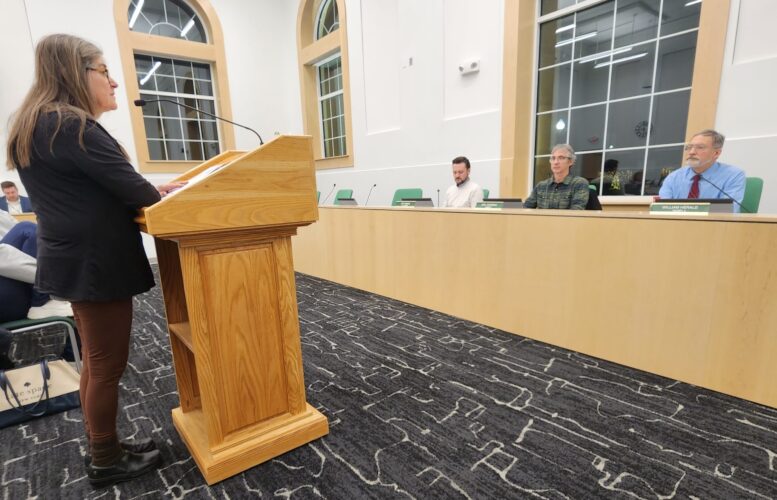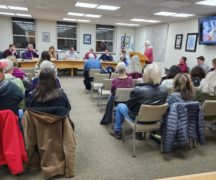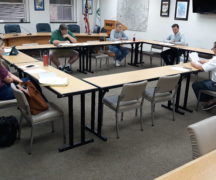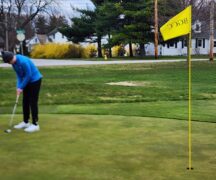By JAN LARSON McLAUGHLIN
BG Independent News
City leaders debated four ordinances Thursday evening aimed at tackling blight in Bowling Green neighborhoods. Discussions at times got deep into the weeds – one of the targets of the proposed rules.
The ordinances addressed junk cars, tall grass, natural landscapes in the right-of-way, and exterior property maintenance. Suggestions were made on how many hoops the city should jump through before mowing unkept yards, if homeowners should be required to wash windows, and if violators can be made to perform community service.
(Note: Window washing and community service did not make the cut for requirements in the ordinances.)
Each of the ordinances was debated at the meeting by people reflecting three different perspectives:
- Council members Joel O’Dorisio, Jeff Dennis and Bill Herald, who all serve on council’s Community Improvement Committee. Their input often focused on making sure the ordinances didn’t trample on rights of citizens, sometimes offering compromises.
- Members of the BG Save Our Neighborhoods Group (BG SONG), which asked that requirements be stricter and more encompassing to provide better protections for neighborhoods.
- City Attorney Hunter Brown, who repeatedly explained the ordinances are intended to fight blight and were closely based on similar laws in surrounding communities.
The ordinances will come before City Council during its Dec. 18 meeting. Following are the ordinances discussed Thursday evening:
Junk cars
The proposed amendment to an existing ordinance would get rid of the requirement that the city has to publish a notice about inoperable vehicles multiple times in a newspaper of general circulation before removal. The change would also remove the hearing for compliance with the city attorney, which would be a conflict.
O’Dorisio voiced his concern about the lack of an appeals process. But Brown assured that there is always a right to a hearing. He also reminded that inoperable vehicles in neighborhoods is already a criminal offense in state and city law.
Members of the council committee voted to send this amendment to City Council for approval.
Noxious weeds/tall grass
Currently, when a homeowner allows grass or noxious weeds to grow higher than eight inches, the city can hire a lawn service to mow the yard and charge the owner $150 an hour. The amendment would get rid of the current requirement that the city must give notice to the homeowner five days in advance of mowing – each time the grass grows too high.
The proposed change would have allowed the city to give the notice just one time in the growing season. With additional infractions, the city would not need to provide notice prior to hiring a mowing crew.
“I’m concerned that it’s very aggressive,” Dennis said, noting that entering someone’s property to mow is “fairly intrusive.”
O’Dorisio said he opposed an amendment allowing the city to contract for a lawn service without giving landowners notice each time. He asked why the city could not just impose a fine.
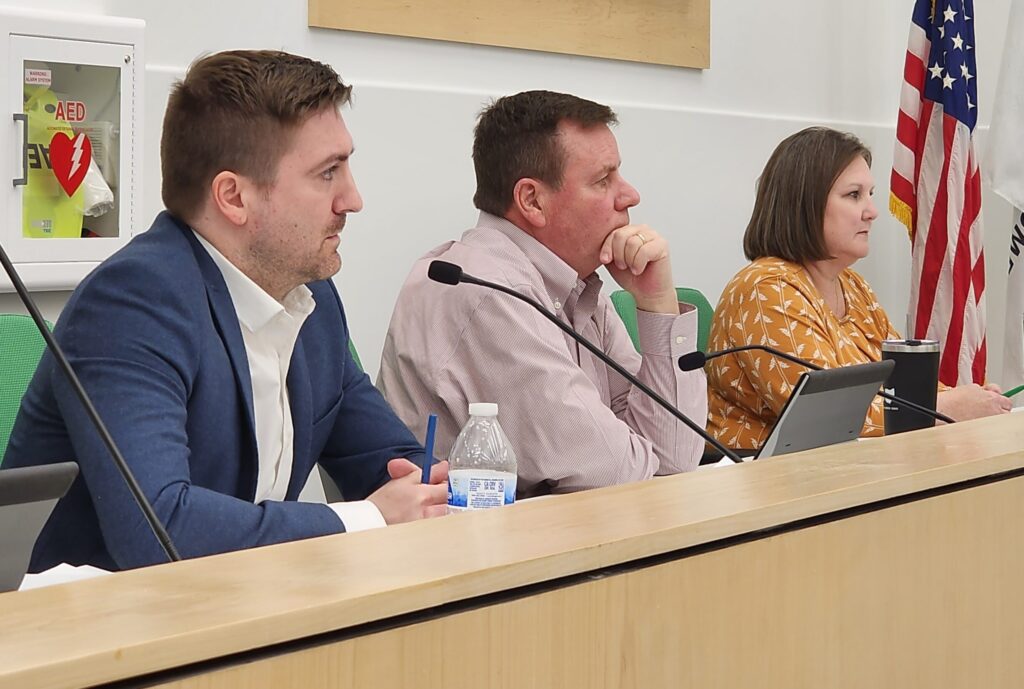
“That’s not always the impetus to action you might think it would be,” Brown said. The goal isn’t to issue fines to people, but to correct problems.
“There are repeat offenders in town that prefer the city to be their lawn service,” Brown said. “We are babysitting these repeat offenders.”
Dennis expressed concern about liability for damaged equipment, for example, if a lawn service runs over a dog chain while mowing. “Any concern we’re going to run into that kind of thing – literally?”
Dennis also mentioned the case of a resident whose child was hospitalized for a couple weeks. Brown assured that the city team that meets each month to discuss problem properties takes individual situations into consideration.
“This isn’t something we do without consideration for the circumstances,” Brown said.
Herald suggested a compromise of changing the proposed amendment to require notices be issued the first and second times that a yard is overgrown.
“That’s a nice middle ground,” Brown agreed.
Managed natural landscapes
This ordinance would allow “managed natural landscapes” in front, side and back yards – but not in right-of-ways, which is generally defined as the area between streets and front sidewalks.
Rose Drain, president of BG SONG, asked that the legislation be tabled until more specific language is developed by people with expertise in wise environmental landscaping and stormwater management.
Brown explained the catalyst for the ordinance was a desire of the city to manage plants in the right-of-way for safety reasons.
O’Dorisio asked that the ordinance note the distinction between restricted and prohibited noxious weeds.
The issue of front yard vegetable gardens came up, with Herald expressing his dislike. But O’Dorisio countered by saying, “I believe people should have the right to grow food in their yard.”
Exterior property maintenance
This ordinance stirred the most debate, beginning with a list of recommendations made by BG SONG, and read by member Kathleen Dennis.
While the citizen organization recognized the efforts to make exterior maintenance of residential and commercial properties a priority, the group offered many suggestions to make the ordinance stronger.
“With this and other ordinances now being discussed and considered, we, as a city, may be able to enhance the appeal of our lovely older neighborhoods and develop equally appealing new neighborhoods as we continue to grow,” Dennis said.
The group suggested the following:
- Asked for tightening of the language about removal of rubbish, which shouldn’t just be triggered by a fire hazard or vermin breeding.
- When addressing lawn materials, the city should include a statement about leaves left in landscaping beds looking tidy and being “deliberately structured so as to preserve the plants and critical biome of the garden.”
- Suggested strengthening of the windows section, going as far as requiring missing or broken glass to be replaced in 14 days or sooner, and inserting language requiring “buildings and windows be washed as needed so as to be visibly clean.”
- Encouraged a statement asking that all properties have at least one or two canopy trees. If a canopy tree is removed, it must be replaced by another somewhere on the property.
- Asked that the ordinance address dumpsters, requiring them to be kept closed and inside fenced areas or screened from view by landscaping.
- Since the fines seem inconsequential, the organization suggested that violations of maintenance and landscaping laws be addressed with community work requirements instead.
Brown pointed out that the financial penalties were structured according to Ohio law.
“You can’t simply impose community service on someone” in lieu of jail time, which can only be required if someone is convicted of a crime, he said.
The only suggestion accepted by the City Council committee was language saying “Windows shall be fully supplied with window glass which is glazed and is without open cracks or holes, so as to exclude adverse weather elements from entering the structure.” The requests on unrealistically prompt replacement of broken windows and on window washing were rejected.
Brown also responded to concerns from O’Dorisio about this ordinance being unconstitutional. He said the ordinance was taken from those in several communities in the region. Brown said these regulations will allow the city to respond more quickly to neighborhood blight conditions.
“This is an additional tool for the city to use,” he said.
Since the city started taking online reports submitted on problem properties in July, 113 complaints have been submitted, Brown said.
“The whole idea is to give the city another way to address these things,” Brown said of the exterior property maintenance ordinance. “Every other community that I know of has one. I couldn’t find any that didn’t have this.”

